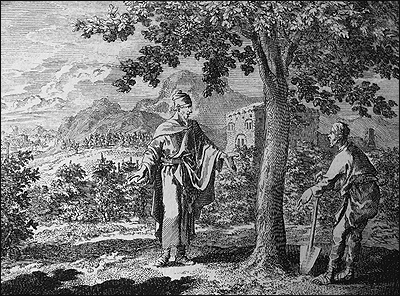
Home > Jesus > Parables of Jesus > The Barren Fig Tree
 The Barren Fig Tree
The Barren Fig Tree
And He began telling this parable: “A man had a fig tree which had been planted in his vineyard; and he came looking for fruit on it and did not find any. 7 And he said to the vineyard-keeper, ‘Behold, for three years I have come looking for fruit on this fig tree without finding any. Cut it down! Why does it even use up the ground?’ 8 And he answered and said to him, ‘Let it alone, sir, for this year too, until I dig around it and put in fertilizer; 9 and if it bears fruit next year, fine; but if not, cut it down.’” — Luke 13:6-9, NASB
The parable concerns God’s impending judgment, man’s unavoidable need to repent, and the grace that makes redemption possible through Jesus Christ. The context falls within Luke’s travel narrative, where Jesus has just emphasized every man's equal need for repentance regardless of circumstance. Using recent examples of sudden and horrible deaths—the slaughter of worshipping Galileans and a tower collapse that took 18 lives—He points out that the victims were no more deserving of their fate than those who are listening to him because death is a result of sin, and the sin nature is present in everyone. By using the tragic incidents as an example, Jesus shows that the souls of the unredeemed will similarly be cut off. While the example does not imply that believers cannot die physically, because of their faith and repentance they will not "likewise perish" spiritually.
From time to time in scripture the nation of Israel is represented by a fig tree and this is another of those instances. In Jesus’s day, Israel's general redemptive state was not good - as the nation of God's chosen people Israel should have been obedient and fruitful but remained rebellious and spiritually barren.
Earlier in Luke 3:9, John the Baptist calls Israel to repentance by warning that the ax already lies at the root of the unfruitful tree. In Matthew 21:18-19 Jesus curses a fig tree symbolizing Israel, because despite its vitality and abundant foliage it had produced no fruit. The message to the Jewish people through these examples is clear, but it is important to understand that the warning is not limited just to them. All are subject to God's judgment; therefore all must repent and be saved lest they be condemned.
The vineyard owner represents God the Father and the vineyard-keeper represents God the Son. The owner's decision to have the tree cut down is a perfectly just one. He has allowed adequate time for it to produce fruit, yet it has not done so and his patience is coming to an end. The vineyard-keeper intercedes to save this tree which will certainly be lost otherwise. For a time, the tree is given an opportunity to respond and become fruitful under the vineyard-keeper's care, just as Israel had been given an extra opportunity to repent when the Messiah came to earth and ministered to them.
Judgment awaits us all, but through undeserved grace God allows us the opportunity to repent of our sins and change our barren spiritual condition by accepting Jesus as Lord and Savior. Though the ax lies at the root of the tree, His intercession has granted a temporary stay of spiritual execution. It is critical therefore that we heed the call of His gospel in this life and submit in repentance while we still have the opportunity.
Image:
Luyken, Jan (1649-1712); Parable of the Fig Tree; Medhurst, Phillip (attribution)
Scripture Alone • Faith Alone • Grace Alone • Christ Alone • To the Glory of God Alone
Most scripture quotations taken from the New American Standard Bible® (NASB)